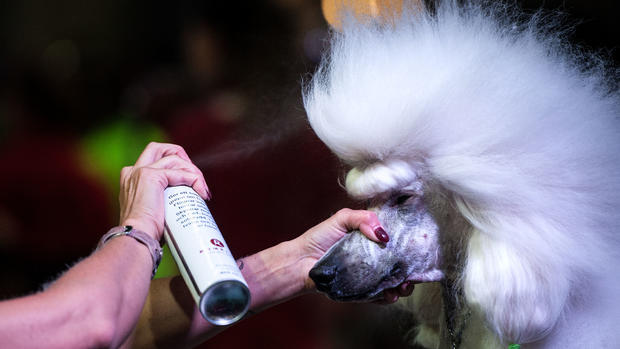Americans spent a record $56 billion on pets last year
LOS ANGELES - Americans spent an all-time high of $55.7 billion on their pets in last year and spending will creep close to $60 billion this year, an industry spokesman said Thursday.
Pets across America live like little humans these days - and as long as people treat them that way, pet spending should keep climbing, said Bob Vetere, the president and CEO of the American Pet Products Association. Overall pet spending has not dipped since record-keeping started, according to APPA, based in Greeenwich, Connecticut.
The biggest part of spending in 2013 - $21.57 billion - went for food - a lot of it more expensive, healthier grub, Vetere told buyers and exhibitors at the Global Pet Expo in Orlando, Florida. The not-for-profit trade association has been tracking industry figures since 1996, when total pet spending was just $21 billion. Adjusted for inflation, that's $31.3 billion.
The humanization of our pets started about 20 years ago, Vetere said in a telephone interview. As people made pets more important parts of their families, manufacturers introduced products that, in the beginning, helped the animals make their move from the backyard to the front room.
He said older Americans are largely feeding the industry's growth, looking to their pets to fill the void left by their children who have grown and moved away from home.
People have always spent more on food than any other pet spending category and pet food trends follow human food and diet trends, he said.
That means if you are on a health kick, chances are your pet is too.
And if humans find a product that works for them, they will look for and demand the same for their pets, he said.
These foods are more expensive, but owners see their pets as "furry, winged and finny extensions of their family," Vetere said, noting that it didn't matter if the pets were dogs, cats, bird, fishes, horses or something else.
Sales numbers show owners are buying more age-specific, breed-specific, vitamin-infused or additive-enhanced foods, Vetere said.
The health of people also plays a role in the robust outlook for the industry's future, Vetere said. "The body of science validating that pets are good for us is growing with strong research in numerous areas of health," he said.
Other spending included $14.37 billion for veterinary care; $13.14 billion for supplies and over-the-counter medicines; $2.23 billion for live animal purchases; and $4.41 billion for other services.
Those services which include grooming, boarding, training and pet-sitting, grew by the largest percentage last year - 6.1 percent.
Health and wellness products, supplies and over-the-counter medications - which grew by 7.4 percent in 2012 - grew only 3.9 percent in 2013, Vetere said.
Sales of live animals - everything except dogs and cats - has fallen off in the past few years, Vetere said. He expects it to drop off another 2 percent this year.
American pets include an estimated 95.6 million cats and 83.3 million dogs, the APPA said. There are also 20.6 million birds, 8.3 million horses, 145 million freshwater fish, 13.6 million saltwater fish, 11.6 million reptiles and 18.1 million small animals.
